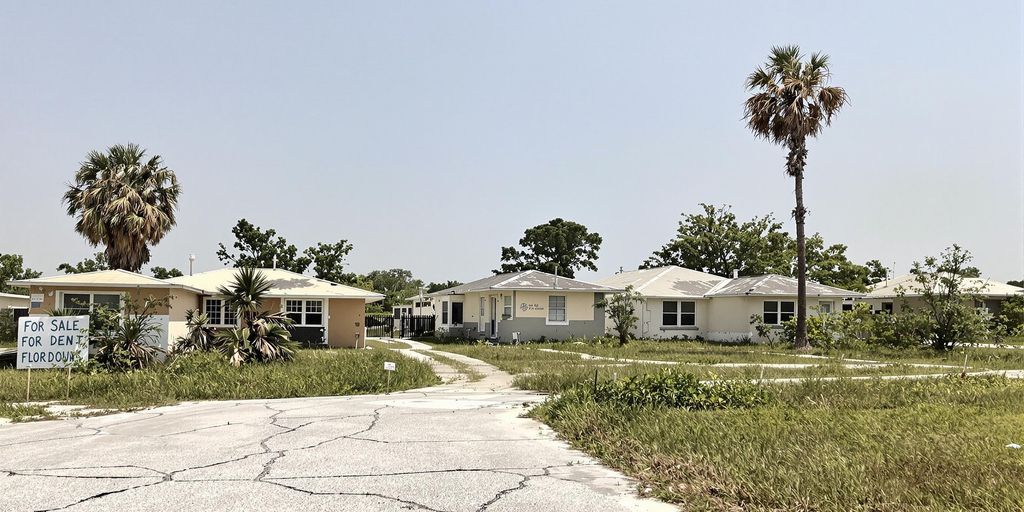Florida’s once-booming housing market is experiencing a significant downturn, marked by widespread price declines and a surge in unsold inventory. A confluence of factors, including escalating insurance premiums, rising HOA fees, higher mortgage rates, and the lingering effects of climate change, is driving homeowners to sell while deterring potential buyers.
The Shifting Landscape of Florida Real Estate
The Sunshine State, once a magnet for homebuyers, is now seeing a dramatic reversal of its pandemic-era housing boom. Data from Realtor.com indicates that Florida dominates the list of markets where home prices are being slashed from their original asking prices. Seven of the top ten such markets nationwide are located in Florida, with North Port, Tampa, Cape Coral, and Jacksonville experiencing significant price cuts.
- Price Reductions: North Port saw nearly 30% of listed homes reduce their prices in April, followed closely by Tampa (29.3%), Cape Coral (28.2%), and Jacksonville (27.6%).
- Inventory Surge: The number of homes for sale in Miami-Dade, Broward, and Palm Beach counties has quadrupled since 2022, reaching levels not seen in nearly a decade.
Key Factors Driving the Downturn
Several interconnected issues are contributing to the current market conditions:
- Soaring Insurance Premiums: Florida homeowners face the highest average home insurance premiums in the U.S., around $11,000 annually, nearly four times the national average. This is largely due to increased climate risks and the impact of recent hurricanes like Ian, Helene, and Milton.
- Rising HOA Fees and Building Regulations: Following the 2021 Surfside condo collapse, stricter building safety regulations have led to mandatory structural inspections and increased HOA fees, particularly for aging coastal condominiums. These costs are being passed on to homeowners, making ownership more expensive.
- High Mortgage Rates: With 30-year fixed mortgage rates hovering around 6.84%, affordability remains a major hurdle for prospective buyers.
- Climate Change Impact: A warming climate is leading to more intense hurricanes, higher storm surges, and increased flooding, further exacerbating insurance costs and making some areas less desirable for long-term investment.
- Decreased Buyer Demand: The influx of out-of-state buyers has slowed, and foreign investment, which once propped up South Florida’s condo market, has significantly declined due to high interest rates and restrictive immigration policies.
Regional Impacts and Outlook
While the statewide trend points to a cooling market, some areas are feeling the impact more acutely:
- Price Declines in Specific Metros: Between January and March 2025, nearly a dozen Florida metro areas reported home price declines. Sebastian saw the most significant drop at 8.2%, followed by Punta Gorda (6.8%), Cape Coral (3.6%), and North Port-Sarasota-Bradenton (3.3%).
- Increased Time on Market: Homes are sitting on the market for longer periods. In Miami-Dade County, homes spent an average of 81 days on the market in April, up 15 days from the previous year.
- Buyer’s Market Conditions: In March, Treasure Coast counties like Martin, St. Lucie, and Indian River leaned towards a buyer’s market, with inventory levels exceeding the benchmark for a balanced market.
Experts suggest that while a price correction is underway, challenges such as rising HOA fees and property insurance rates will continue to impact affordability. The combination of rising inventory, falling demand, and escalating costs has created a
Sources
- Home prices fell in Martin, Indian River counties, Treasure Coast News.
- Housing market hitting the brakes? New analysis finds Florida dominates areas slashing home prices, Florida Politics.
- Climate Change Is Causing The Florida Real Estate Market To Tumble, CleanTechnica.
- Florida House Prices Are Falling in Nearly a Dozen Cities, Newsweek.
- Southern state residents ‘desperate to escape’ but homes won’t sell as crash looms, Daily Mail.


